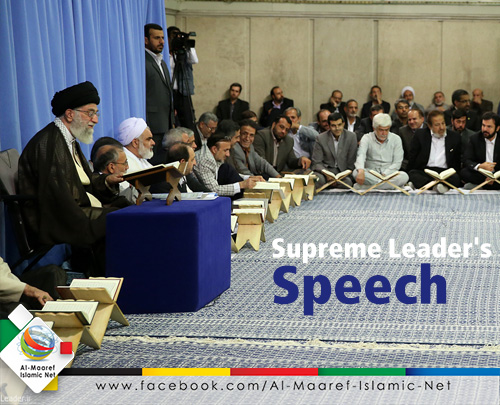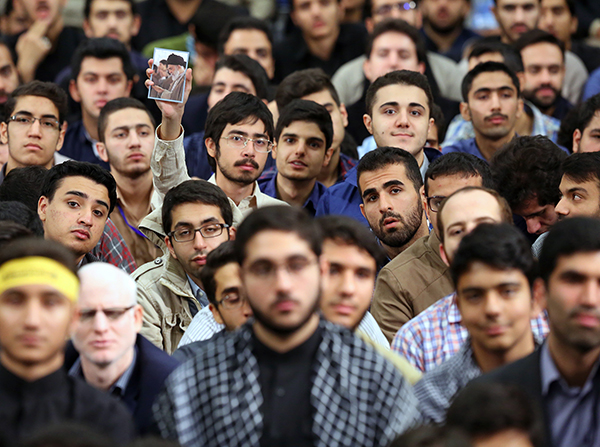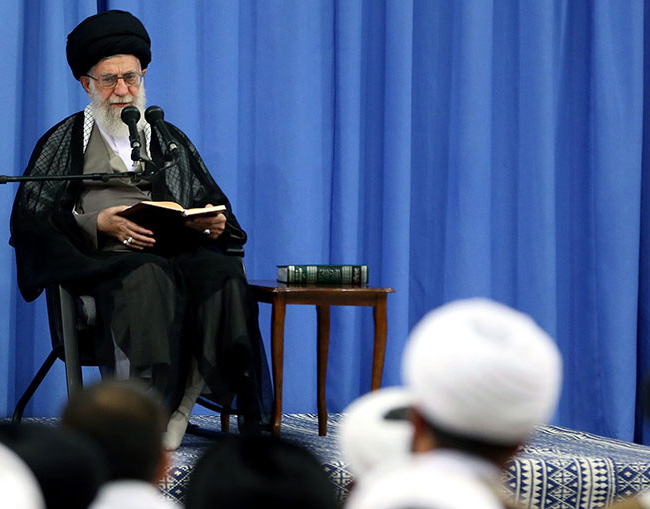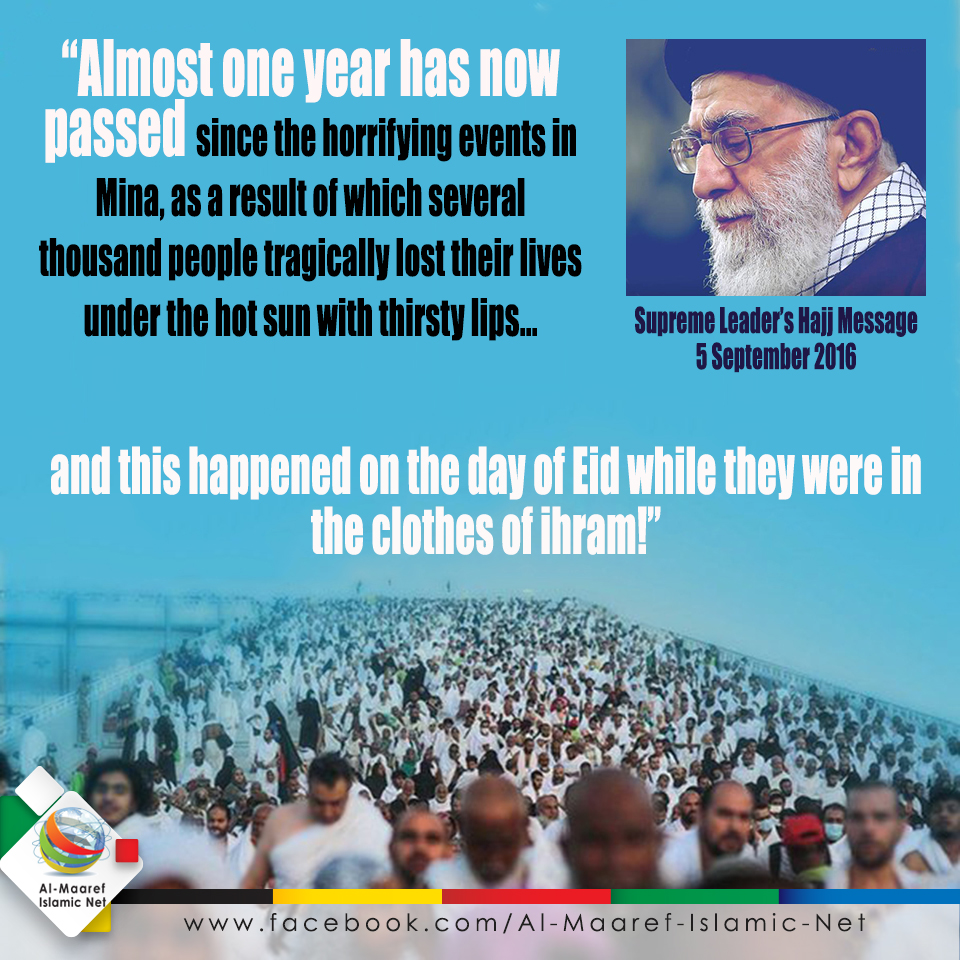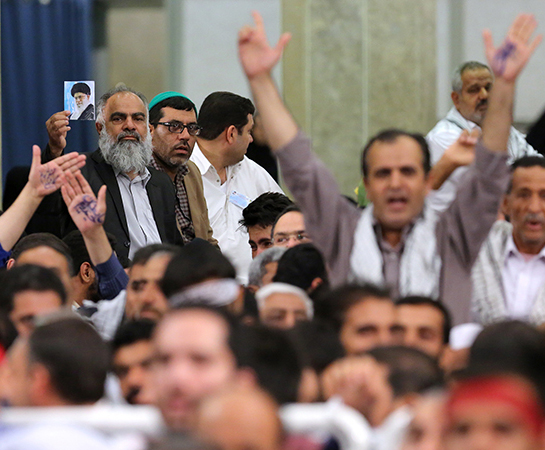Supreme Leader's Speech at Annual Ramadan Quranic Meeting_18/06/2015
The following is the full text of the speech delivered on June 18, 2015 by Ayatollah Khamenei, the Supreme Leader of the Islamic Revolution, at the annual Ramadan Quranic meeting. The meeting was held on the first day of the holy month of Ramadan.
In the Name of Allah, the Beneficent, the Merciful
I sincerely thank the dear brothers and I really benefited from your recitation today. It is a very good, beautiful and meaningful meeting with diverse and mellifluous recitations and I thank God for this. When we see that each year, the signs of progress in reciting the Holy Quran are visible among our youth and our people, this makes me very happy and I thank God for this. Thanks to these good recitations, today's meeting was very meaningful, significant and delightful particularly because of the good point that our talented and eloquent presenter raised regarding the offering of these recitations and what was achieved in this meeting to the pure souls of the martyrs who were buried in Tehran recently.
Reciting the Holy Quran in a good voice and tone and observing the requirements and conventions of recitation is an introduction to the entrance of the Quranic concept into hearts. However, if we merely benefit from this aspect of the Holy Quran and if we only look at it as an act of recitation and beautiful melody, we will surely be demoted from this lofty rank and position. The purpose of all this emphasis on reciting the Holy Quran in a good voice, in a beautiful tone and by observing the requirements is that Quranic concepts influence hearts, that we establish a close relationship with the Holy Quran and that we take a Quranic mold and color. If this is the goal, then it has certain requirements and conventions. The first convention is that a reciter of the Holy Quran should recite the Book by believing in the Holy Quran and the concepts that he is reciting. If we do not know what we are reading, if we do not understand the concepts and if it does not influence us in a deep way, then our recitation will exert little influence on others and on us. This is the first condition.
I request that the honorable reciters, Quranic experts and reciters of the Holy Quran pay attention to this point. First, they should review, in their minds, the ayahs that they want to recite. They should deliberate on them and truly absorb the depth of these concepts in their hearts and their beliefs. They should recite the Holy Quran with this morale and with such preparation. If they do so, their recitation will deeply influence their audience.
Of course, you have moved forward to a great extent until today. It is many years now that I have been witness to the movement of the Holy Quran in the country. Today, our youth have made great progress. Our Quran reciters and our Quranic experts are really and truly good, but there is still considerable room for exerting more influence.
I have written down two, three points. One is that you want to convey Quranic concepts to your audience with your recitation. Although most of your addresses do not know Arabic and the language of the Holy Quran, the Holy Quran's miracle lies in the fact that even if you try to convey, in a deep and efficient way, Quranic concepts under these circumstances - that is to say, while your addressees do not know Arabic - they will penetrate the minds of your audience. Of course, this may be done in an incomplete way.
Well, this naturally has certain conditions. I listen to the recitations that are broadcast on "Radio Talavat". This medium is a good opportunity for listening to the recitations of the Holy Quran. I listen to the recitations of our Quranic experts and our good qura. To be fair, our Quran reciters are very good and outstanding in terms of having a good voice. This has been acknowledged by foreign qura. I have heard them speak highly of Iranian qura. Some of you really have good and rich voices which have all the requirements for an outstanding voice, but this should be accompanied by the requirements of recitation.
One of the requirements for reciting the Holy Quran is that when you want to recite a Quranic ayah, you should definitely stress those parts that you would stress if you wanted to convey a message under normal circumstances. If we want to make a comparison, we can refer to the panegyrists who recite Persian poems. As you can see, they recite those words and those sentences that they want to convey in a way that it is recorded in the mind of the audience. This is what we do in everyday conversations as well. When you engage in a normal conversation, you stress those words which carry a special meaning and purpose for you. You should recite the Holy Quran like this. You should stress specific words. You should recite Quranic sentences in a way that their messages and meanings are instilled into the minds of the audience. Good words and sentences should be accompanied by good recitation.
Sometimes, it is necessary to repeat a sentence in order to instill it in the minds of the audience. So, you should sometimes repeat it. A few years ago, I may have criticized those who repeated Quranic ayahs too much. Now, I want to say that repetition is sometimes necessary and vital. With one reading, the message is not conveyed. Therefore, it should be repeated two, three times. Sometimes, you should repeat two, three ayahs together. I do not mean that this should be done to excess. I have seen that some Egyptian Quran reciters do this to excess. This has a negative effect. So, I do not mean that it should be done to excess. If we repeat something eight, ten times, this is not ideal. It may be common in Arabic singing, but it is not ideal in reciting the Holy Quran. However, repetition - until the message is instilled in the mind of the audience - is necessary.
Sometimes, one feels that a reciter recites the Holy Quran as if he were taking a book in his hands and reading it word by word. This is not good and it does not fulfill the purpose. You should instill the message into the minds of the audience. Sometimes, this is possible with repetition and sometimes, it is possible by stressing a sentence or a word. This should be done.
Another point that should receive attention is observing the tone. Of course, Arabic and Quranic tones are not tangible for our people and qura. They are not tangible tones. A person who recites a Persian poem does so with the appropriate tone, but if the same person wants to read out an Arabic poem or sentence, he may not be able to choose the appropriate tone because they are foreign to us. They are not familiar and tangible tones like Persian tones and songs. However, Quranic tones are gradually becoming tangible for Quranic personalities and reciters of the Holy Quran. This is because of repetition and exposure to the Holy Quran. These tones should be adopted in the right way. I sometimes listen to reciters who recite Quranic ayahs in a pleasant and very good voice. Their voices are of a high quality and they have strength and a good pitch and vibration, but they do not observe the tone. Observing the tone - that is to say, the order and discipline of the song and what your recitation is based on - is necessary.
You do not recite the Holy Quran in an ordinary way. You recite it in a rhythmic way. Perhaps in all religions - at least, in all those monotheistic and non-monotheistic religions which I am familiar with - holy texts are recited in a rhythmic way. We have witnessed this up close. So, you should recite the Holy Quran in a rhythmic way and this rhythm and tone should be observed. The tone should be adopted by observing its requirements. If this is not done, it will undoubtedly not produce the desired effect and it sometimes produces the opposite effect.
I would like to raise another point. Almost all of those individuals who are present in this meeting are qura. One of the things which has become common among Arab Quran reciters- the Egyptian Quran recitersand Quran reciters from other countries - and which has been promoted in our country by them is attaching too much significance to linking and assimilating words. I do not understand the reason for this. It is not at all necessary for us to link Quranic words and ayahs with the purpose of assimilation. In my opinion, this is not necessary at all. Of course, it is sometimes necessary and conveying the message is sometimes dependent on assimilating words. So, Quran reciters can do this, but the beauty and effect of recitation is not dependent on assimilation at all.
Now, a number of well-known Egyptian towns are skilled at assimilation. And the audience applaud such towns - in a way that it is typical of the common man - when they assimilate words and they constantly say, "Allah, Allah". In my opinion, both what the reciter and what the audience do is wrong. There are some individuals among good and outstanding Egyptian Quran reciters who do not frequently use assimilation and whose recitation is very good. Besides, they exert considerable influence. We can cite Abdul Fattah Sha'shaye as an example. As you know, he does not use assimilation, but at the same time, he is one of the best and most influential reciters. I hope that Allah the Exalted will bestow His mercy and forgiveness on him and on all qura. Therefore, I request that Quran reciters do not bother with assimilation. The same is true of too much repetition. This is not necessary either.
Because our time is over now and adhan is about to be said, I will only raise this point: I request that the audience observe limits when they want to applaud a reciter and when they want to say, "Allah, Allah". This is also another act of imitating the Arabs. As soon as a reciter of the Holy Quran begins reciting, some people constantly say "Allah" as if it were one of the necessary requirements after recitation. But it is not necessary to do so at all. Sometimes, you are deeply moved by someone's very beautiful and influential recitation and you applaud them involuntarily. According to the Arabs' tradition, Quranic applause is done by saying "Allah, Allah". Of course, this is not particular to the Holy Quran. When someone sings an ordinary song, they say, "Allah, Allah".
There is nothing wrong with this, but if we constantly say, "Allah, Allah" as soon as a reciter begins reciting the Holy Quran, this is not necessary at all. I request that you yourselves advise - in those meetings where you are considered as teachers and experts - participants to avoid saying "Allah, Allah" to excess. When a reciter recites the Holy Quran in a very beautiful and artistic way, it is alright to applaud him. However, one sees that some people say, "Allahu Akbar" as soon as the reciter says, "I seek Allah's protection from the cursed" [A Quranic phrase that is used when someone wants to begin reading the Holy Quran].
I hope that God will associate all of you with the Holy Quran and that He will build your life in this world and in the hereafter by the blessedness of the Holy Quran.
Greetings be upon you and Allah's mercy and blessings


